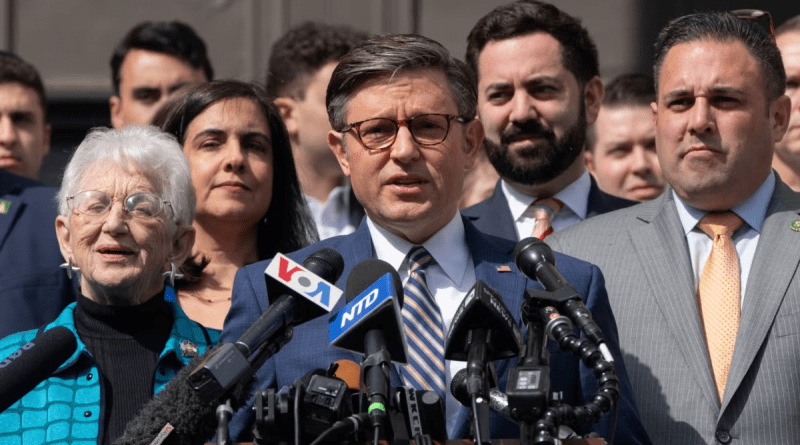Johnson has not found common ground with university students in New York City
Columbia University students booed House Speaker Mike Johnson on Wednesday as he visited one of the nationwide student demonstrations taking place across the country today over Israel’s war on Gaza.
Johnson’s visit, which he said was aimed at supporting Jewish students who have been threatened by some Palestinian supporters. The speaker visited the university after the provost’s office extended a deadline until Friday morning to reach an agreement to dismantle an encampment that has come to symbolize the student protest movement on campus.
Some of the student protests taking place across the country have been broken up with the help of law enforcement.
In Texas on Wednesday, mounted police broke up a protest at the University of Texas at Austin and arrested 20 people, and at the University of Southern California in Los Angeles, an encampment was torn down by campus police officers.
Other demonstrations took place today at Brown University in Providence, Rhode Island, the University of Michigan in Ann Arbor, MIT in Cambridge and California State Polytechnic University in Humboldt.
Protesting students demanded that the universities withdraw financial assets from Israel and sought to pressure the U.S. government to limit Israeli strikes against Palestinian civilians.
Israel’s harsh response followed a deadly raid by Islamist militants from Hamas, which controls the Gaza enclave, on Oct. 7.
Johnson’s rhetoric, characterizing groups of protesters as a “mob” and the situation on campus as “chaos,” contrasted with the reality of the situation at Columbia University on Wednesday, where students were walking to class and checking their phones.
Palestine supporters, who greeted Johnson with whistles and laughter, did not drown him out completely, though the speaker was hard to hear because he spoke into press microphones rather than over a loudspeaker.
“While Columbia University has allowed these lawless radicals and provocateurs to seize the initiative, the virus of anti-Semitism has spread to other campuses,” Johnson said as he stood on the stairs of the university library, calling for protesters to be arrested if violent, and threatening to cut off federal funding to universities that fail to restore order.
Johnson, whose position as House speaker is under threat from ultraconservative Republicans in his caucus, was greeted rather coldly by students at New York University, known as a bastion of liberalism.
In a politically polarized country, conservatives describe themselves as protecting the public from liberal activists, many of whom say Republican attempts to portray protesters as anti-Semitic have been greatly exaggerated for political purposes.
Johnson also met with Jewish students who said they are afraid to come on campus, saying they have been spit on and seen swastikas painted on walls.
As Johnson spoke on the steps of the library, protesters at a nearby encampment paid little attention to him.
Students at the camp say their protest was peaceful and that other people unaffiliated with their movement are behind any provocative clashes off campus.
“We are sorry that this peaceful movement is being ignored and politicians are diverting attention from the real issues,” said Mahmoud Khalil, a Palestinian student at Columbia University who was involved in talks with college administrators about the protests, though he did not stay at the camp. “This is academic freedom, this is freedom of speech,” he said.
Free speech advocates from the organization PEN America called the sudden escalation at the University of Texas “deeply troubling.”
“The administration should be doing everything it can to keep students safe and the campus functioning, but calling in state police to break up a peaceful protest that has barely begun is doing the opposite,” Kristen Shahverdian, director of PEN’s Campus Free Speech Program, said in a statement.
The political fallout reached the White House, where spokeswoman Karine Jean-Pierre said President Joe Biden believes free speech, debate and non-discrimination are important on college campuses.
“We want things to be peaceful,” Jean-Pierre said at a briefing Wednesday. – It’s important that students feel safe … There should be no violence, there should be no hate rhetoric.”
